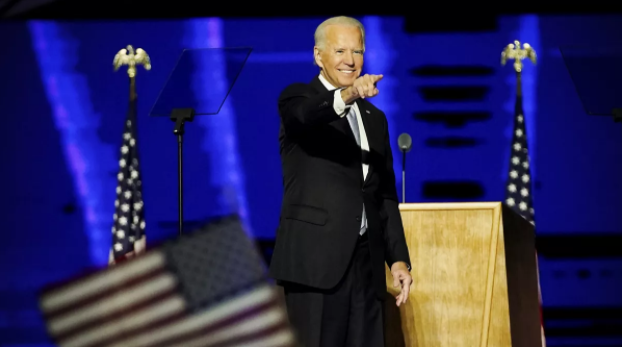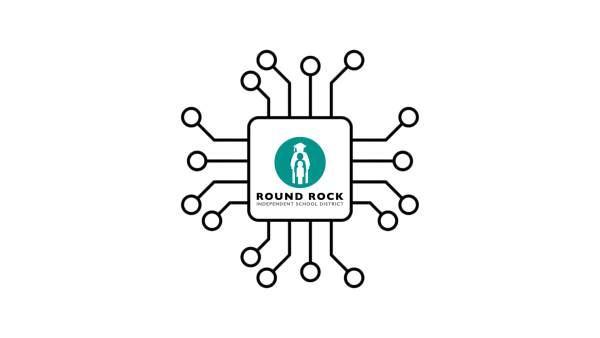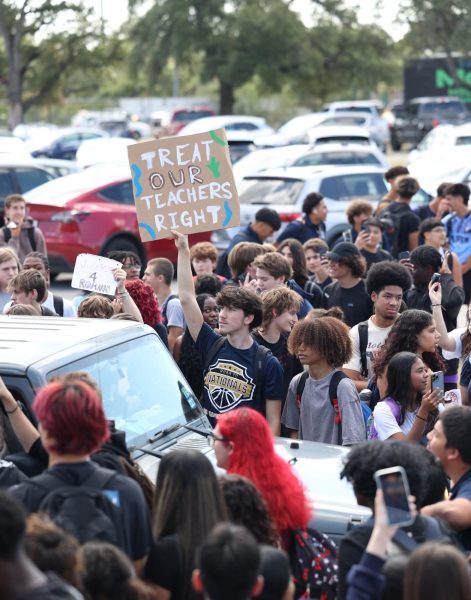America’s Greatest Hope for the Next Four Years is Unification
Image by AP News
President-elect Biden stands onstage at victory speech in Wilmington, Del.
For years, America has fallen further into division. Each issue divides people in a different way than ever before. Disagreements corrode relationships, causing hatred between father and son, brother and sister. It’s not that the issues are different than in decades past, either. It’s just that while things such as racial divide or nationalism have always existed, there’s a growing resurgence in the idea that total disregard for the lives and thoughts of others is acceptable. Many times it comes masqueraded as “freedom of speech” or “expressing an opinion.” It is not just speech, it’s hate speech. The difference in our division now, is that it is targeted at each other. Every opinion is meant for the other party to hear, everyone wants to make each other mad. The reason for this is Donald Trump. His constant attacks have caused seemingly irreparable divides, but hope lies in Biden to heal our nation.
Donald Trump’s campaign was not entirely unique. What was unique was his attitude towards opposition. Prior to his campaign, an unspoken agreement of common courtesy has often existed in politics, but Trump changed that. He stood out right away as a different kind of politician to his supporters, one that didn’t hold back. He went after everyone and everything he wanted to: journalists, citizens, immigrants, other politicians and Taylor Swift for some reason. No one was safe. His words set a dangerous precedent, and not just one for Republicans or supporters, but for everyone. Republicans and Democrats alike attack each other in the press, and in our day-to-day lives.
Politics have become an undeniable part of our world, instead of brief dinner conversations. Besides tearing families and relationships apart, this division has had horrible consequences in our political system. Even the pandemic has been politicized, making an efficient government and citizen response much more difficult to achieve. It’s as if the only thing Democrats and Republicans can agree on is division and anger.
Throughout this divisive election, Joe Biden was a kind of “in between” candidate. Not many people loved him, but not many people truly hated him. In Biden winning the primary, it seems that Americans struck a compromise, something that has become a rare event. Though it may sound bleak, it’s possible that Biden’s presidency will mainly serve as four years for America to neutralize, and that isn’t necessarily a bad thing. Right now, an “in between” president may be exactly what America needs. We need someone who can mend our wounds and deescalate the situation. Biden’s victory speech on Nov. 7 shows that he understands that this is what America needs from him, for now at least.
“The Bible tells us, to everything there is a season, a time to build, a time to reap and a time to sow and a time to heal,” President-elect Biden said in his speech. “This is the time to heal in America.” The entirety of the speech centered on rebuilding democracy and “restor[ing] the soul of America,” as Biden put it. There was not an emphasis on policies, only an optimistic tone regarding our future. For many watching, this was a refreshing change from persistent attacks and anger from the White House over the past few years.
Hopefully, something good will come from this presidency. Maybe Biden can bring restoration of what has kept us together in America: common courtesy and an ounce of obligatory respect. The greatest hope is that Biden can pull us out of the storm of anger and insults and help us remember that we’re all just people. Though we have differing experiences and opinions in life, that doesn’t mean we have to hate each other. Perhaps a day will come when grandfather and granddaughter can talk about politics without that familiar feeling of simmering rage beneath the surface. This is America’s greatest hope for Joe Biden: unficiation.
Your donation will support the student journalists of McNeil High School. Your contribution will allow us to purchase equipment and cover our annual website hosting costs.






